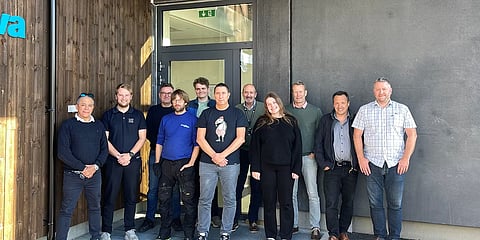

Photo from the OPTIFLEKK kick-off meeting at Akvaplan-niva's research station (FISK) outside Tromsø.
Photo: Akvaplan-niva.
A new research project is aiming to develop knowledge and techniques for stable and efficient juvenile spotted wolffish (Anarhichas minor) farming in Norway.
The three-year project, OPTIFLEKK, is being led by Akvaplan-niva, a Norwegian research and consultancy company that specialises in aquatic environment and aquaculture science, and is financed by Norway's Fisheries and Aquaculture Industry Research Fund (FHF).
According to the researchers, the project's focus is on developing and refining hatchery and early-stage rearing protocols, with the goal of generating practical knowledge that benefits existing producers while paving the way for newcomers to commercial wolffish aquaculture.
The research will be carried out at Akvaplan-niva’s Research and Innovation Station (FISK) at Kraknes near Tromsø, as well as at partner facilities, led by principal researcher Atle Foss. The consortium includes researchers and students from Nord University and UiT The Arctic University of Norway, along with industry partners Aminor, Amar Seafood, and others.
Spotted wolffish, known for its firm white flesh and tolerance for cold-water farming, has been identified as a promising candidate for diversification within Norway’s aquaculture sector. However, expansion of farming this species has been constrained by challenges in larval and juvenile rearing - issues the OPTIFLEKK team hopes to overcome through targeted experimentation and improved protocols.
A kickoff meeting was recently held at Akvaplan-niva’s facility outside Tromsø, bringing together researchers, students, and industry representatives to outline the project’s work plan and research milestones.
Another Akvaplan-niva project focusing on another wolffish species was announced recently, in collaboration with the Norwegian Institute for Water Research, this time with a focus on ocean restoration.
The "BlueRewilding" aims to restore depleted kelp forests in Northern Norway through the repopulation of Atlantic wolffish (Anarhichas lupus), one of the natural predators of sea urchins. The project will raise 500 juvenile wolffish from wild-caught broodstock at Akvaplan-niva’s research station outside Tromsø, before a controlled release into coastal waters.
